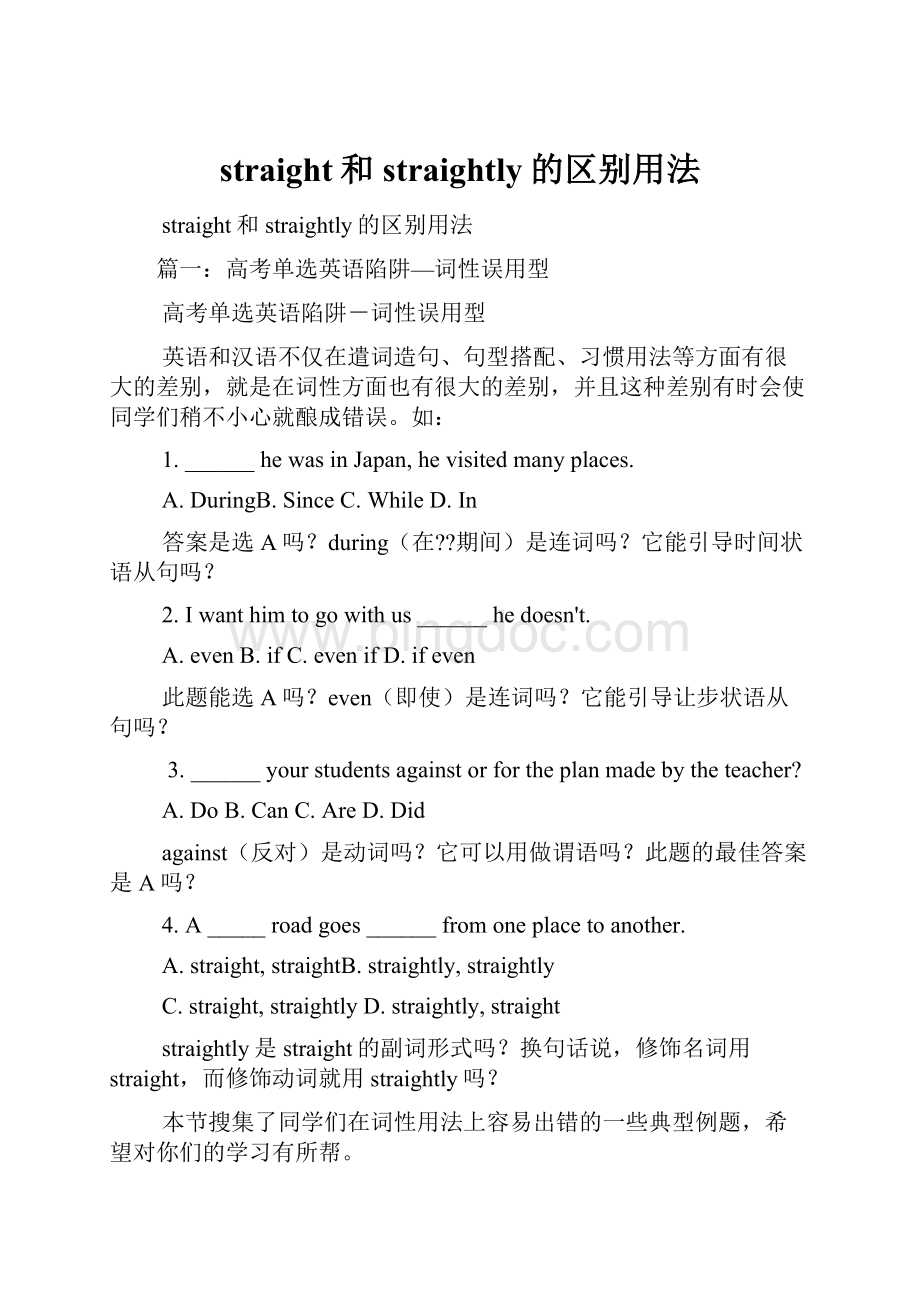straight和straightly的区别用法文档格式.docx
《straight和straightly的区别用法文档格式.docx》由会员分享,可在线阅读,更多相关《straight和straightly的区别用法文档格式.docx(15页珍藏版)》请在冰点文库上搜索。

even(即使)是连词吗?
它能引导让步状语从句吗?
3.______yourstudentsagainstorfortheplanmadebytheteacher?
A.DoB.CanC.AreD.Did
against(反对)是动词吗?
它可以用做谓语吗?
此题的最佳答案是A吗?
4.A_____roadgoes______fromoneplacetoanother.
A.straight,straightB.straightly,straightly
C.straight,straightlyD.straightly,straight
straightly是straight的副词形式吗?
换句话说,修饰名词用straight,而修饰动词就用straightly吗?
本节搜集了同学们在词性用法上容易出错的一些典型例题,希望对你们的学习有所帮。
1.during可用做连词引导从句吗
______hewasinJapan,hevisitedmanyplaces.
A.DuringB.SinceC.WhileD.In
此题容易误选A,将介词during误用做连词。
正确答案应为C。
不过此题若改为如下形式,则应选介词during:
hisstayinJapan,hevisitedmanyplaces.
A.DuringB.SinceC.WhileD.In
但是下面一例要填while,而不能填during,因为其后接的已是一个介词短语,所以不
宜再用介词during,而用while,可将其视为省略句:
______atschool,hewrotehisfirstnovel.
可视为While(hewas)atschool,hewrotehisfirstnovel.之省略。
5.straightly是straight的副词形式吗
A______roadgoes______fromoneplacetoanother.
A.straight,straightB.straightly,straightly
C.straight,straightlyD.straightly,straight
此题容易误选C,认为第一空是用于road前作定语,故用形容词straight(这是对的);
第二空应填副词straightly,用以修饰动词goes(这就不对了)。
在现代英语中,straight既可用做形容词,也可用做副词。
straightly这个副词形式在现代英语中已被废弃,许多词典均不再收录此词。
所以此题最佳答案应选A。
6.close可表示“关着的”吗
Hefelldowntotheground,hismouth______andeyes______.
A.open,closeB.opened,closedC.opened,closeD.open,closed
此题很容易误选A,其实应选D。
open和close均可用做动词,前者表示“开”,后者表示“关”,是一对反义词,如:
Pleaseopenyourmouth.请张开嘴。
Pleasecloseyourmouth.请闭上嘴。
但是open和close也可用做形容词,此时前者意为“开着的”,后者意为“接近的”“亲近的”等,并不表示“关着的”,要表示“关着的”,英语用closed,即用做形容词时,open与close不是一对反义词,而与closed才是反义词。
7.suddenly可用做连词引导从句吗
Iwasabouttogoout______thetelephonerang.
A.whenB.suddenlyC.assoonasD.directly
此题很容易误选B,因为从句意看,填入suddenly后刚好符合“我正要出去,电话铃突然响了”的语境。
但从句法来分析,空白处前后各为一个句子,而suddenly是副词,显然不承担起连接两个句子的作用。
此题最佳答案选A,when在此用做并列连词,意为“这时(突然)”。
又如:
Wewereabouttostart,whenitrained.我们正要开始,就下起雨来了。
Shewaswalkingdowntheroadwhensheheardsomeoneshoutingforhelp.她正在路上走着,突然听见有人呼救。
8.afraid可用做动词吗
Don'
t_____;
noonewillhurtyou.
A.afraidB.frightenC.fearD.nervous
此题应选C,其余三项均容易误选:
选A不对,因为afraid是形容词,Don'
t应接动词原形,若填beafraid则也可以;
选B不对,因为frighten虽为动词,但它为及物动词,其意不是“害怕”,而是“使(某人)害怕”,选它不仅意思不通,而且语法也不对(因为及物动词后缺宾语);
选D也不对,因为nervous是形容词,不能紧跟在don'
t之后。
9.against是介词还是动词
______yourstudentsagainstorfortheplanmadebytheteacher?
A.DoB.CanC.AreD.Did
此题正确答案是C,但很容易误选A,主要是没有意识到其后的against是介词,而不是动词。
注意:
有些介词、形容词、副词等,具有动作意味,不要将其误认为是动词。
如果你不能去,就让他代你去。
误:
Ifyoucan'
tgo,lethiminsteadyou.
正:
tgo,lethimgoinsteadofyou.
tgo,lethimgoinstead.
注:
instead和insteadof均含有“代替”、“取而代之”的意思,在汉语中含有动作意味,但它们却不是动词(instead是副词,insteadof是介词)。
10.abroad是副词还是名词?
Nowsomeyoungpeoplehopeto______forfurthereducation.
A.goabroadB.gotoabroadC.gototheabroadD.gotheabroad
此题容易误选B或C,将abroad误认为是名词。
其实abroad是副词,所以此题正确答案为A。
又如:
当心,前面有危险。
误:
Lookout,thereisdangerintheahead.
正:
Lookout,thereisdangerahead.
析:
ahead意为“在前面”,它是副词,而不是名词。
11.可用friendlily作为friendly的副词形式吗?
Hetreatedallthepeoplearoundhim,______hekneworhedidn'
tknow,______.
A.if,friendlyB.whether,friendly
C.if,inafriendlywayD.whether,inafriendlyway
此题第一空应填whether,因为它与其后的or构成whether...or...结构,表示“无论?
还是?
”,至于第二空,许多同学可能会误选friendly,认为它以ly结尾,应是副词,在此用做状语。
而其实在现代英语中friendly只用做形容词,不用做副词。
所以此题的最佳答案是D,而不是B。
顺便说一句,下面以ly结尾的也是形容词,而不是副词:
lonely(孤独的),costly(高价的,昂贵的),lively(有生气的,生动的),lovely(可爱的,美
丽的,愉快的),orderly(整齐的,守规则的)等。
Hefeelslonelyamongstrangers.在陌生人中他感到孤寂。
Wehadalovelyweekend.我们度过了一个愉快的周末。
Thecaristoocostlyformetobuy.这汽车太贵了,我买不起。
Heisalivelychildandpopularwitheveryone.他是个活泼的孩子,大家都喜他
12.lack可用做形容词吗?
Thebosspraisedtheyoungmanforhishardwork,thoughhe____experience.
A.islackofB.islackinginC.lacksofD.islackingof
此题答案选B,belackingin是习语,意为“缺乏”,其后通常接experience,frankness,courage等抽象名词。
选A是错误的,因为lack可用做名词和动词,但不用做形容词;
选C是错误的,因为lack用做动词时,它是及物动词,其后不用介词(注:
用做名词的lack后可接介词of);
选D是错误的,因为没有belackingof这个搭配。
篇二:
形容词和副词练习及答案
1.Itwas_____opportunitytomiss.
A.toogoodanB.atoogoodC.tooagoodD.toogood
2.Idon’tlikeitatall.Itcan’tbe_____.
A.betterB.worseC.bestD.worst
3.Therewasnothingspecialaboutthisfilm—itwasonly______.
A.particularB.averageC.interestingD.strange
4.Shelooksvery_____butIcan’trememberhername.
A.similarB.familiarC.friendlyD.strange
5.Hesaidhewouldreturnthemoney,andIwas______.
A.foolenoughtobelievehimB.enoughfooltobelievehim
C.foolenoughbelievinghimD.enoughfoolbelievinghim
6.“Thisbookis______moreusefulforusstudents.”“Yes,butitis_______toodifficult.”
A.quite,quiteB.much,rather
C.rather,quiteD.quite,much
7.Thechildrenalllooked_____atthebrokenmodelplaneandfeltquite_____.
A.sad,sadB.sadly,sadly
C.sad,sadlyD.sadly,sad
8.Thechilddreamedthathehadoncelivedina_______houseintheforest.
A.woodenprettylittleB.littleprettywooden
C.prettylittlewoodenD.woodenlittlepretty
9.Hewantedtoreadmore,soheaskedhisfriendsiftherewas_______toread.
A.somethingeasyenoughB.somethingenougheasy
C.enougheasysomethingD.easyenoughsomething
10.Thedoctorassuredthepatientthattherewas______withher,butshecouldnothelpworrying.
A.seriouslywrongnothingB.nothingseriouswrong
C.nothingseriouslywrongD.seriousnothingwrong
11.—Howisyourfather?
—He’sfine.He’s______toplaytenniseverySunday.
A.enoughactivestillB.enoughstillactive
C.stillactiveenoughD.stillenoughactive
12.—Didyouwashyournewsuitinhotwater?
—Ofcoursenot.Iamnot______foolish.A.veryB.thatC.verymuchD.too13.—Whichteamis_______towinthegame?
—Idon’tknow,butI’vefound_______forourstowin.A.probable;
itunlikelyB.likely;
itpossibleC.possible;
itpossibleD.likely;
itpossibly14.Hedidn’tunderstandthe_____question,sotherewasa_____expressiononhisface.A.puzzling;
puzzledB.puzzling;
puzzlingC.puzzled;
puzzledD.puzzled;
puzzling15.Shecanspeak_______infrontofMack,butshecan’teat______inhisrestaurant.A.free,freeB.free,freelyC.freely,freeD.freely,freely16.Itwasrainingheavily.LittleMaryfeltcold,soshestood____tohermother.A.closeB.closelyC.closedD.closing17.Fredissecondtononeinmathsinourclass,butbelieveitornot,he_______passedthelastexam.A.easilyB.hardlyC.actuallyD.successfully18.Wedon’tcareifahuntingdogsmells__________,butwereallydon’twanthimtosmell____.A.well,wellB.bad,badC.well,badlyD.badly,bad19.“_____doyouthinkofyourEnglishteacher?
”“Oh,heisan_____man.”A.What,interestingB.What,interestedC.How,interestingD.How,interested20.Theoperationwassuccessful,butIstillfelt_____.A.verypainfulB.muchpainfulC.alotofpainD.verypaining21.“Ourteamis_____towinthematch.”“Really?
ButIdon’tthinkso.”A.easyB.difficultC.possibleD.sure22.Ithinkheis_____totellusthesecret,butI’mnotsure.A.possibleB.likelyC.impossibleD.certain23.Let’smakeitatseveno’clockonTuesdaymorningatmyofficeif________.A.you’reconvenientB.itisconvenientforyouC.youfeelconvenientD.itisconvenientwithyou
24.Weweretwohourslatethatday,whichwasduetothe______.A.crowdedtrafficB.crowdedtrafficsC.busytrafficD.busytraffics25.Maryisverycleverand_____worthteaching,butherbrotherisnot.Look,heisnow_____asleepinclass.A.very,veryB.much,veryC.well,veryD.well,fast26.“CouldItakeyourordernow?
”“Yes.One_____teaandtwo_____coffees.”A.black,whiteB.red,whiteC.black,greenD.red,black27.Enteringthehousewefoundhimlyingonthebedwithhismouth_____andeyes_____.A.open,closeB.opened,closedC.opened,closeD.open,closed28.A______roadgoes______fromoneplacetoanother.A.straight,straightB.straightly,straightlyC.straight,straightlyD.straightly,straight1.我从未见过这样漂亮的画。
_____________________________________________2.那是个非常动人的故事。
_____________________________________________3.Bob是两个男孩中较高的一个。
_____________________________________________4.今天不如昨天冷。
_____________________________________________5.他比汤姆年龄小。
_____________________________________________将下列句子译成英语
语法填空
用所给词的适当形式填空
(tight,short,develop,culture,clear,good,necessary,count,actual,age,like,common)Whileincomeworryisa1commonproblemoftheaged,lonelinessisanotherproblemthatparentsmayface.Ofallthereasonsthatexplaintheirloneliness,alargegeographicaldistancebetweenparentsandtheirchildrenisthemajorone.Thisphenomenonis“EmptyNestSyndrome”(空巢综合症).
Inordertoseek4chancesoutsidetheircountries,manyyoungpeoplehavegoneabroad,leavingtheirparentsbehindwithno5ideaofwhentheywillreturnhome.Theirparentsspendlonelydaysandnights,takingcareofthemselves,inthehopethatsome
daytheirchildrenwillcomebacktostaywiththem.ThefactthatmostoftheseyoungpeoplehavegonetoEuropeanizedorAmericanizedsocietiesmakesitthattheywillholdasvalueofdutyastheywouldhaveiftheyhadnotlefttheircountries.Whateverthecaseis,ithasbeennotedthatthevaluestheyholddo